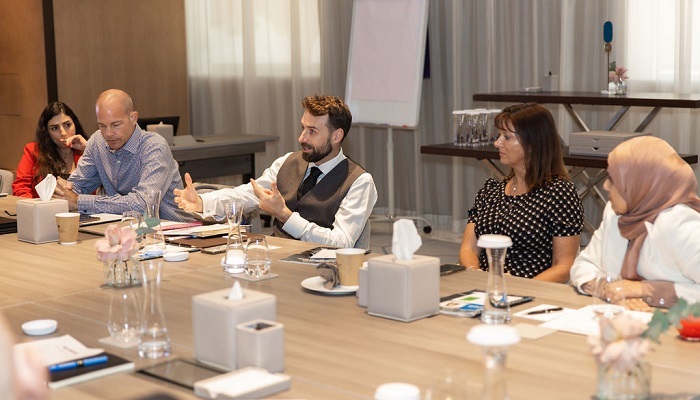One of the initiatives fuelling the surge in international private medical insurance (IPMI) and migration into the Middle East, and particularly Dubai, has been the growth of startups, with many people moving in as economies around the world stutter and stumble.
But as the panel for this Health & Protection Middle East International Private Medical Insurance Roundtable explained, these businesses have their own needs and requirements when it comes to health insurance coverage.
DOWNLOAD THE FULL ROUNDTABLE SUPPLEMENT BY FOLLOWING THIS LINK
As Lockton Middle East North Africa account director – international people solutions Neil Carruthers explained, the firm has seen an influx of inquiries coming in about people who are looking to set up a business.
But in many instances, despite having the start-up capital, investors and visa approved they have not yet decided what the business will be doing yet, they just know they want to be in the region.
“At that start-up point, it is a challenge in this market to find the appropriate cover at the appropriate cost for individuals just coming into this region and the local versus international insurance element is a key topic for people,” he said.
“They are asking should they be looking at familiar international providers, what are the differences between local and international offerings, and are they there to support a small business that’s looking to grow?
“For the most part there’s a lot of unanswered questions as there aren’t many insurers looking to support those startups – one individual looking for the support of a corporate policy but unable to find it.”
Pacific Prime CEO Middle East and Africa David Hayes noted that the fast growth of these companies can also prove tricky to accommodate.
“You might start with a group of four or five people who take a policy that’s fit for purpose, but within six months, you’ve got 50 staff and you’re underwriting every member of that particular policy,” he said.
“But the UAE is positioning itself maybe as Switzerland for the 21st century, any regulations that are going to come in, they’re going to be the most palatable to attract business.
“This is the place to be so I think we’re in for a good five or 10 years.”
Easy access
A case in point and key reason for this growth in the SME sector is that it is extremely easy to set up a company, with businesses providing complete packages to do so, including a trading license and even medical insurance.
As Ashwin Ramesh, head of employee benefits at United Insurance Brokers explained, the first year companies use the health insurance that has come with the package, but by the time they reach renewal, they are ready to move on and get the correct benefits.
“For people moving into Dubai, it’s good for someone to come and tell them, I’m going to do everything for you because it’s not a known space,” he said.
“So when they put in medical insurance they say ‘Let’s see how it goes’ but then after the first year they are gone and unfortunately you’re on medical insurance, you will stay for a year.
“So by the time they understand how it works, then come in the brokers.”
Berns Brett Masaood director of retail Alka Sudhakaran added she had been working closely in the startup area and understood why the region was so popular with these firms.
“A lot of startups, especially from the Middle East and North Africa region, are finding Dubai as a soft landing spot,” she said.
“What I’ve seen within the business community and government is they have all been most welcoming to startups, giving them access to the respective sectors, whichever industry they want to be in.
“The Dubai economy formed the commercial setups where they are facilitating one unit to encourage startups with dedicated people ready to help access whichever industry you want and to get exposure to all the groups there.
“They have all been set up with access so the founder can come in, get that experience, have that dialogue and understanding.
“As you rightly said, the first year someone helps them with the package and along with that, they have access to these points, then they have time to figure out which health plan to choose and which benefits to go for.
“That launchpad is something which, especially within the UAE, they are encouraging a lot.”
Focus on the deeper package
Rachel Slaiby, assistant vice president, senior business development analyst at Marsh Emirates Insurance Brokers recognised that this massive demand from startup businesses needed some special and creative thinking on health insurance products and noted this had been considered with special underwriting conditions, especially for firms based in the free zone.
But she also highlighted a key divide commonly seen between those start-ups originating from smaller or less established organisations and those from already established global firms.
“I did work for a startup for around three years and there’s something that I have seen in the market,” she said.
“I didn’t like the focus on mental health, wellness, office spaces and those perks, but not on the salaries and not on the packages.
“Yes, they will make it attractive, especially for the new generation with things like foosball in the office or some kind of employee event, but if you really dig in, you will see a little bit of funding issues and low salaries.”
However, she contrasted that with a start-up from a major global company where typically employees are well compensated and supported by the organisation’s infrastructure.
“But for local start-ups from scratch, I see the perks and the attractiveness of the package, but I also see the struggle,” she concluded.
DOWNLOAD THE FULL ROUNDTABLE SUPPLEMENT BY FOLLOWING THIS LINK
